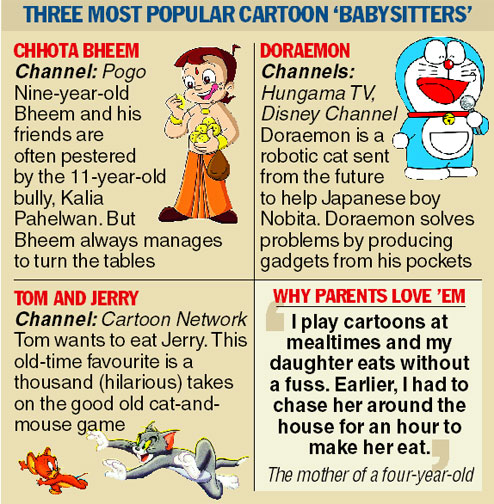 |
• If your infant son throws a tantrum at lunch and nothing — absolutely nothing — can make him eat his carrots, chances are you already know what to do: switch on the TV and play him his favourite cartoon.
• You have tonnes of household chores piled up and don’t want your three-year-old daughter in the way, so you switch on the computer and play her favourite cartoon DVD. She doesn’t move from the couch for an hour.
Sounds familiar? Children have always loved cartoons but lately parents, too, are increasingly becoming dependent on them — as a magic wand to control the little one. Kids love ’em and parents bless ’em. It’s a win-win solution, right? Not quite.
Dependence on cartoons as “de facto babysitter” could have several implications — both immediate and long-term — on a child, experts have cautioned. “I play cartoon channels at mealtimes and my daughter eats up whatever is offered without a fuss,” says the mother of a four-year-old. “Earlier, I had to chase her around the house for an hour to make her eat.”
“Most parents rely on cartoons while feeding their children, not caring whether the child is gobbling up the food or properly chewing and digesting it,” said Malini Bhagat, the principal of Mahadevi Birla World Academy. “There are parents who buy CDs of cartoons from bookstores to keep their kids occupied while they watch their favourite soaps.”
Psychologist Salony Priya, the director of Umeed, a counselling and training centre, says it’s only natural that an overdose of cartoons would induce violent behaviour in children. “Children for whom cartoons are constant companions rarely relate to anyone else. The parents have been substituted by the cartoons,” she warned.
The role of the cartoon as babysitter has come under the scanner. “It’s because cartoons have become de facto babysitters that children can blackmail their parents or hold them to ransom for something as simple as eating their meals. The habit of sitting at a dining table to eat and the social skills associated with eating never actually shapes up,” said J.R. Ram, clinical psychiatrist at Apollo Gleneagles Hospitals.
Short-term effects of cartoon overdose include a lower tolerance level and more aggressive behaviour among children, even as early as three to four years. “They will often resort to hitting someone to get even a small thing like a pencil or pen,” said Debjani Rudra, the head of the pre-primary section of La Martiniere for Girls. “They idolise cartoon characters and think they always have to fight for their rights, as shown in many of the cartoons.”
Acting out the characters is another tendency among children, who rarely think — or, indeed, can think — about the consequences. A seven-year-old boy kept hitting his bedridden grandfather with karate chops while his parents were away at work, not realising the pain he was inflicting. “It is a sort of virtual reality that these kids are living in, and their perspective of reality gets stunted. They often imitate the onscreen acts, not realising it is capable of inflicting pain, physically and emotionally,” said Salony Priya.
Parents should also know that constant exposure to cartoons makes kids unable to focus or concentrate. “Children get used to loud noises and fast images. As a result, their brain is able to focus only on very stimulating images and can’t concentrate on the normal pace of classroom teaching,” said Ram.
So how should you make a three-year-old eat his greens? “We ask parents to read out a story while the child is eating and to construct a story around the meal itself. Parents should be very judicious as to what they are exposing their child to,” said Kaveri Dutt, the principal of Modern High School for Girls.
Monitoring what the child is seeing is very important, as is allotting a specific time each day for cartoons, felt Debjani Rudra. “It’s not advisable to ban children from watching cartoons altogether because that would ignite curiosity and children might watch it on the sly,” she said.
How many hours of cartoon TV/DVD does your child watch every day? Tell ttmetro@abpmail.com










